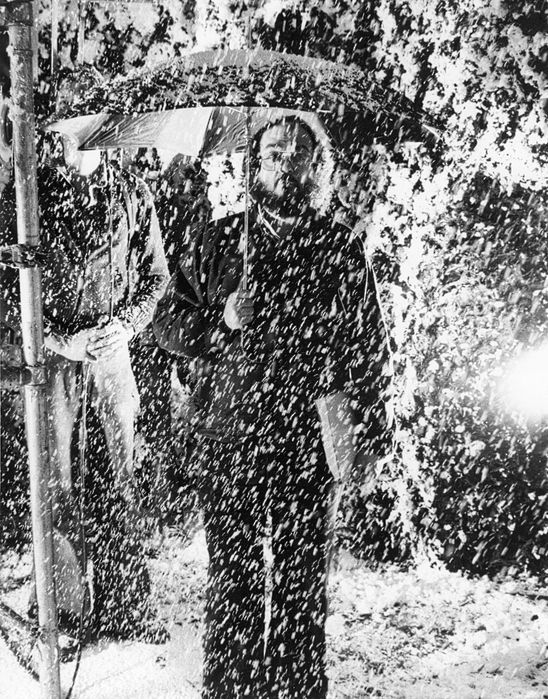THE MEMORY OF WATER FORGETS ITS WAY, LOSING ACTORS AND AUDIENCE IN A FUNERAL OF WORDS
By DAN VALENTI
PLANET VALENTI Arts
(LENOX, Monday, June 27, 2011) — An ensemble “relationship” play with a funeral, family dysfunction, and a ghost surely has the ingredients of a winner — especially in the hands of an ensemble without any weak links in the chain. So what’s missing in Shakespeare and Company’s production of The Memory of Water, now playing through Sept. 4 at the company’s Bernstein Theater in Lenox?
It’s not the acting, directing, set, lighting, sound, or any other identifiable element within the control of S&Co. Once we eliminate these, we turn to playwright Shelagh Stephenson, which puts the blame on artistic director Tony Simotes for selecting this clunker.
A Whiny Script with an Identity Crisis
Stephenson writes a whiny script that can’t decide if it’s a comedy, a tragedy, a ghost story, or a satiric homage to Woody Allen’s film, Hannah and Her Sisters. We end up with a talky, balky pity-fest. The play falls grievously short on the topic of grief.
Three sisters — Mary (Corinna May), Teresa (Kristen Wold), and Catherine (Elizabeth Aspenlieder) — come together on the occasion of their mother Vi’s (Annette Miller) funeral. Playing tag-along are Mary’s married lover, Mike (they’re both doctors) and Teresa’s whipped husband, Frank (together they run a vitamin store, which he hates doing; he wants to open a pub).
The sisters can’t handle death. They give their mother a perfunctory nod but mostly spend the two and a half hours feeling sorry for themselves. This might have worked if Stephenson had given one of the men a redeeming role — “For God’s sake, Teresa, this isn’t about YOU. This is about your mum.”
The play centers on the sisters’ memories, and each testifies to different recollections of the same events. Their disparate experiences are so removed from each other that it doesn’t seem to matter what they are saying. No one listens. Everyone hurts inside and twists the dagger into the others. The womens’ recollections emerge not so much as reminiscences but as hauntings. In the forced reliving of shared memories and unshared desires, the sisters cough up and spit out inner demons but fail to exorcise them.
Great Ensemble Cast Goes to Seed in Funeral of Lame Lines
So far so good, but another of Stephenson’s fatal error involves a lack of differentiation among the three sisters. Their woes and crises are as interchangeable as the dead mother’s clothes that they try on with girly delight. The one sister who manages to craft her angst as more of an idyll, Mary, does so in bas relief to the shrieking hysterics of the drunken Teresa and puerile lamentations of the irresponsible Catherine.
The wonderful ensemble talent can’t make silk purses out of this sow’s-ear material. Jason Asprey goes as underutilized as a snowblower in Berkshire July. The always-satisfying Nigel Gore is reduced to set dressing. Annette Miller, as My Mom the Ghost, can’t make cavier out of Cheez Whiz.
Stephenson places snippets of crackling dialogue into the mouths of the actors, but she fails to tie the pneumonic theme of memory into coherence. She makes no Statement on death. She can’t even get us to care about what should be the sorrowful occasion of siblings dealing with the death of a parent.
Corinna May as Mary fares the best among the three sisters. She evokes Diane Keaton, circa Woody Allen, which fits into the play, given the overt and not-so-obvious references to the Wood Man. May’s Mary possesses a maturity the other two sisters lack. May delivers her lines as if she’s peeling the skin off an orange, getting her fingers underneath and listing up. If only she had better things to say and do. As it is, she gets to whatever pulp exists beneath her character’s dialogue and comes the closest into serving the juice.
Kristin Wold as the ditzy Catherine keeps losing control of her character, who keep losing control of her emotions. Her drunken tirade, meant by Stephenson to be one of the play’s signature pieces, comes off, rather, like a … drunken tirade, full of whining and self-doubt, signifying nothing. After 22 seasons with the company, Wold — as do the other veteran actors in this play — deserves much better.
The usually effervescent Elizabeth Aspenlieder comes off oddly flat as the uber-ditzy Catherine. One of the problems lies with age. Catherine is a part written for a much younger actress. Aspenlieder needs more than an unconvincing blonde wig to rise to the surface of such stultifying veneer. One wishes someone in the play or even the audience will take the juvenile Catherine and slap her into some sense. It doesn’t happen.
Playwright Chickens Out on Dealing with the Big D
Stephenson displays a painful uncomfortableness with her main topic, the Big D, Death. She refuses to plumb the emotions of loss, anger, fear, numbness, like a kid whose afraid of the dark and doesn’t turn off the bedroom light. She tries with dismal results to mask her fear with some of the lamest humor seen in these parts for a while.
One wonders what director Kevin Coleman thought when handed The Memory of Water. Did Simotes say, “Here. Deal with it”? or did either or both men actually think this play would work. There’s only one set, no action save from forced slapstick-cum-farce, and talk talk talk talk talk. Coleman says in his director notes that, the “initial reading in last year’s Studio Festival” helped “in bringing this play alive.”
We must inform all, though, that The Memory of Water arrives dead on arrival, far more of a goner than Mama Vi, whose ghost at least tries to come back to deal with unfinished business.
Whiny Sisters and Men as “I Don’t Get It” Types
Water may have a memory, but Stephenson presents memory as a pastiche without making a unified statement other than that the sisters feel sorry for themselves, hate their lives, and saddle the men with bags of psychic garbage far heavier and cluttery than the plastic bags into which they throw the dead Vi’s belongings.
Set designer Patrick Brennan serves up an unimaginative bedroom which, in its utility, lacks any touch of figurativeness. That includes the poorly done crack over the bed, stage right, inserted to suggest the fragility of the characters. He matches two end tables on either side of the bed and puts a distracting painting on stage left that throws off the balance. One can “read” lots of intent. Lighting designer, like most everyone else, has little to do except fade in and out and switch on and off. Sound designer Michael Pfeiffer goes for the easy score with Nat Cole’s “Unforgettable.”
The sisters cannot agree on anything that pulls them together and agree to disagree on everything that pulls them apart. They even fail to understand the irony that their differences produce commonalities. Each wallows in self-loathing, but each is too self-centered to notice or care about their dead mother, their men, or each other. The audience feels the same way.
We identify with the badgered Mike (Nigel Gore) and Frank (Jason Asprey). The women expect them to be psychic and fathom the hidden desires and hurts that women refuse to express (ah, a female’s old “ally”). What’s a guy to do? Stephenson presents the men as the “I don’t get it types” and thinks the audience will by identifying with the sisters. The opposite happens. In the end, we wish the three gals were carried out in the box along with their mother. What a waste of Asprey and Gore.
In Vi’s final speech, she liken’s her fatal Alzheimer’s disease as being lost in a disjointed sea dotted with islands of memory. It’s the feeling the audience has in this snoozer, in the end. By then, The Memory of Water has become My Mother, The Stiff.















The big bad has hit all of us.